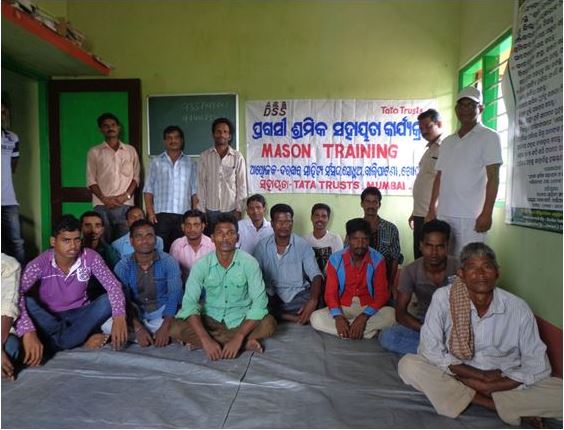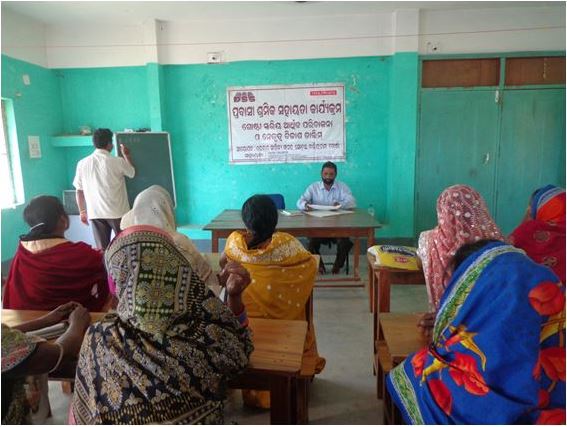|
|
|
|
|
|
|
|
|
|
|
|
|
|
|
Throughout human history, migration has been a courageous expression of the individual’s will to overcome adversity and to live a better life. Today, globalization, together with advances in communications and transportation, has greatly increased the number of people who have the desire and the capacity to move to other places. This new era has created challenges and opportunities for societies throughout the world. It also has served to underscore the clear linkage between migration and development, as well as the opportunities it provides for co-development, that is, the concerted improvement of economic and social conditions at both origin and destination. This month the SHRAM Bulletin focusses on the Influx of Migration in the context of the hardships faced by the migrants at the global level.
|
|
|
|
|
|
|
1. From a State of Low Return Aajeevika Bureau Makes Migrants Move
Rajeev Khandelwal
The communities that inhabit the dry, hilly, rain-fed and drought prone tracts of India have long learnt to manage two diverse realities that mark their lives. The first is their struggle to work their unproductive land despite small landholdings and frequent failures of rain. The second reality is that every year thousands among them will move away from their villages to search for a living. This is how they will earn their incomes, possibly save some of it, and bring it back to their homes as much awaited cash.
|
|
2. Knowledge Creation and Information Sensitization of Beneficiary Groups
Grameen Development Services
Grameen Development Services (GDS)had organized an awareness camp for the migrant workers at Shramik Sahatya Kendras (2SK) in order to promote information regarding the services and schemes that are meant for the benefit of the migrant workers and their families. This report summarizes the activities undertaken by the organization and the importance of such camps is also made implicit. Field organizations, from time to time, have to create such spaces of information sharing and knowledge dissemination.
|
|
|
|
|
|
|
|
|
|
|
|
|
|
|
|
|
|
|
1. Return Migration and Reintegration Policies: A primer
Marianne Haase, Pia Honerath
The primer rests on the assumption that conditions for sustainable return hinge on individual factors (for example whether return is voluntary or not) as well as structural ones (such as access to the labor market). Home and host countries face different situations and therefore use different intervention measures. Given the challenges migrants face during their process of return and reintegration, and the need to acknowledge the often untapped potentials of return migration.
|
|
2. The Research Proposal of Internal Migration and Economic Development: Bangladesh Perspective
zakiul alam
Pregnancy, generally in our country, is accepted after marriage. And marriage is almost universal in Bangladesh and in many other countries. The early the marriage, the early the pregnancy might be. The early pregnancy which is simply called adolescent marriage makes trouble maternal life. Even this pregnancy makes unnecessarily maternal death as well as child death.
|
|
|
|
|
|
|
|
|
|
|
|
|
|
The data hub this month shows the total male and female migration from Madhya Pradesh to different states.Explore SHRAM Data Hub for more info.
|
|
|
|
|
|
|
|
|
|
|
|
|
|
 |
|

1. Mason Training to Migrant Youth by Darabar Sahitya Sansad
Darabar Sahitya Sansad
Shramik Sahayata O Soochana Kendra (SSSK) of Darabar Sahitya Sansad (DSS), Sodhua, Balipatna, started a one month long Mason training from 25.06.2016 to 25.07.2017 for 20 migrant youth. The programme was inaugurated at SSSK Balipatna. Mr. Dillip Kumar Ojha, president of press club- Balipatna inaugurated the training. 20 trainees are participating in the training programme.
|
|
|

2. Financial Literacy and Management Training to SHG Leaders
Darabar Sahitya Sansad
Shramik Sahayata O Soochana Kendra of Darabar Sahitya Sansad (DSS), Sodhua, Balipatna organised an one day financial literacy and management training at DSS office on 29.06.2016. 29 women SHG leaders participated in the training programme. The participants belonged to migrant families. Ms. Mamata Choudhury and Mr. Premananada Tripathy, the SHG trainers conducted the training programme.
|
|
|
|
|
|
|
|
|
|
|
|
|
|
|
|
|
|
|
|
|
Help! I did not register for this. If you have not signed up and do not wish to receive emails from us, please click here to un-subscribe your email id. For any queries on SHRAM please contact: anchor@shram.org
|
|
|
|
|
|
|
|
|
Copyright of the website rests with Sir Dorabji TATA Trust and the Allied Trusts.
Website designed, maintained and developed by IRIS Knowledge Foundation |
|
|
|